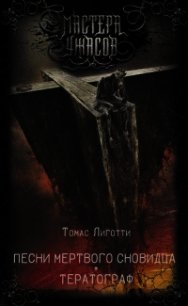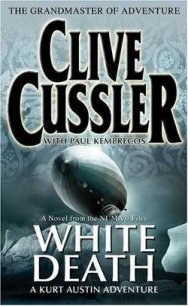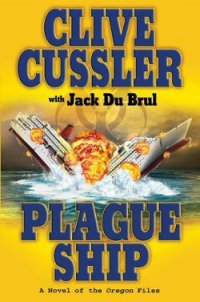Corsair - Cussler Clive (полная версия книги TXT) 📗
“Sounds like transport back out to me,” Juan guessed.
“That’s our read, too,” Eric replied. “They’re going to be moving more men than they can carry in that old Mi-8 you flew on from the crash scene.”
“What’s the capacity of the choppers?”
“Fifty at least.”
“Hell of an assault force.”
Mark said, “The target has to be the peace conference.”
Eric Stone shook his head. “Never happen. The security is impenetrable. There is no way a terrorist is going to get within a mile of a single dignitary.”
“They would if the Libyan government’s in on it,” Max countered.
“That’s the million-dollar question. If Minister Ghami is Suleiman Al-Jama, does Qaddafi know it?”
“How could he not? He appointed him.”
“Okay, say he does, Max. That still doesn’t mean he knows what Al-Jama is planning.”
“What difference does it make?” Hanley asked.
“Maybe none, but it’s something we need to know.”
“And how do we find out?”
“I’ll get to that in a minute. Mark, is there any chance we can take out those choppers?”
“We’d need to launch another UAV,” Eric said before Mark could answer. “The first drone’s out of fuel, and I had to ditch it. Though not before taking this.”
He handed Juan a grainy still photograph from the drone’s video camera. Details were murky to say the least, but it looked like two armed men escorting a third person toward one of the helicopters.
“Is that Secretary Katamora?”
“Possibly. Factoring the height of a typical Libyan male and comparing the middle figure to them, the height is right, and the build certainly fits. The person’s head is covered so we can’t see hair, which would have been a dead giveaway—hers flows to the middle of her back.”
“Best guess?”
“It’s her, and by the time we turn around she’s going to be long gone.”
Juan frowned. He’d made a conscious decision to save the Libyan prisoners rather than wait out the terrorists. The balance of one life versus one hundred tipped the same way no matter who sat on the scales. But being so close and not getting her irked. “Okay, what about taking out the other choppers?” he said to get the meeting back on course, his eyes lingering on the picture.
“We could laze them from the second UAV so I can guarantee a missile hit, but we have to consider collateral damage if Secretary Katamora’s there.”
“Options?”
“Nail the choppers in flight if they come out over the ocean. But, again, we risk her life if she’s a hostage aboard one of them.”
“They’ll stick to the desert anyway,” Eric said.
Max cleared his throat. “Listen, why not pass on what we know to Overholt and let him tell the other delegates about the possibility of a massive attack?”
“We’ll tell Lang,” Juan replied, “but I don’t want that information disseminated.”
“Why the hell not?”
“Two reasons. One, if they know the attack is coming, they will call off the conference, and the chance to get these people in a room talking peace again is zilch. The conference has to proceed. Second, we have nothing concrete linking Ghami to Al-Jama. This is our one and only chance to expose him and his entire operation.”
“You’re risking a lot of important lives.”
“Mine, for one,” Mark said.
“I admit it’s the biggest toss of the dice we’ve ever attempted, but I know it’s worth it. Overholt will agree. He understands that if we can nail Al-Jama on the eve of the peace conference, it will give it such a boost that the delegates are certain to hammer out a comprehensive and lasting treaty. In one blow, we take out the second-most-wanted terrorist on the planet and guarantee lasting peace.”
“Boy, Juan. I’m not sure. The prize is awesome, yes. But the price, you know . . .”
“Trust me.”
Still uncertain, but never one to doubt the Chairman, Max asked, “So how is this going to work?”
“In a minute.” He turned his attention to Murph and Stoney. “What did you two come up with?”
“There’s not a whole lot out there that doesn’t fall into the realm of fantasy.”
“Hold it,” Max interrupted. “What did you have them research?”
“Alana said there might be something called the Jewel of Jerusalem stashed in the original Suleiman Al-Jama’s tomb. She was told about it by St. Julian Purlmutter. Even he wasn’t sure what it was. What did you guys find?”
“You haven’t given us much time on this, so our report is sketchy at best. There are two schools of thought. Well, three, if you include the vast majority of scholars who think the whole thing is baloney. Anyway, one school says the jewel is a cabochon ruby about the size of a softball with some words carved into it. People believe it may be Sura 115 from the Koran, a final chapter to the Muslim holy book that appears nowhere else because Muhammad believed it so perfect and so special that it could only be written on a flawless jewel.”
“Any idea what it says?” Juan asked.
“Depends on which side of the radical line you stand. The nut jobs think it says they should kill infidels all the livelong day. Moderates ascribe to the idea that it promotes peace between Islam and Christianity.”
“So no one knows.”
“Exactly,” Mark said skeptically. “Take any object, give it the ability to bring special knowledge or power, and, voila, you’ve got yourself a legend that’ll last for generations. Kinda like the Ark of the Covenant. Total bunko, but people still look for it today.”
“Skip the commentary and stick to the story.”
“Okay. They say that Saladin first brought the jewel to Jerusalem following his siege of the city in 1187 and that the stone was kept in a cedar box in a cave beneath the Dome of the Rock. The legend says that any man who dared gaze upon the stone went blind or mad, or both. Convenient, eh?
“So the stone sits in its underground vault until the Sixth Crusade in 1228. During this one, Frederick II of the Holy Roman Empire made a treaty with the ruler of Egypt that turned over control of all Jerusalem to the Christians, except the Dome of the Rock and the nearby Al-Aqsa Mosque. It was during this period that German mercenaries working for the Knights Templar stormed the Dome and stole the jewel.”
“Why would Christian knights want an Islamic relic?”
“Because they thought it was something else. Remember, I said there were two schools of thought. This is where their paths cross. You see, the Templars believed the Jewel of Jerusalem wasn’t a ruby at all. They thought it was a pendant fashioned a thousand years earlier for a man named Didymus, or Judas Tau’ma.”
“Never heard of him,” Max grumbled.
Eric said, “You know him better as Doubting Thomas, one of Christ’s twelve Apostles.”
“And this pendant?” Juan prompted.
“As you know, in the Bible story Thomas didn’t believe Christ’s resurrection and demanded to touch the wound. The Bible doesn’t say whether he did or didn’t touch Him, but the Templars were convinced that he did. They believed the Jewel of Jerusalem was a crystal into which an alchemist called Jho’acabe had encapsulated the traces of blood left on Thomas’s fingers. The crystal was then hung from a necklace that fell into Muslim control when Saladin took the city.”
“If that were true wouldn’t the Muslims have destroyed it?” Hanley asked.
“Actually, no,” Eric replied. “By all accounts, Saladin treated the city’s Christians and their churches respectfully. He might not have given back the pendant, but I doubt he would have intentionally destroyed it either.”
“So now the jewel, either a ruby or a necklace, is in the hands of the Templars. How does it end up entombed with Suleiman Al-Jama?”
“Because the ship carrying them back to Malta—”
“—is attacked by Barbary pirates.” Juan answered his own question.
“One of Al-Jama’s ancestors, in fact,” Eric said. “The cedar chest with the jewel inside gets passed from father to son until Al-Jama’s death. Henry Lafayette left it in the tomb, and so it sits today.”




